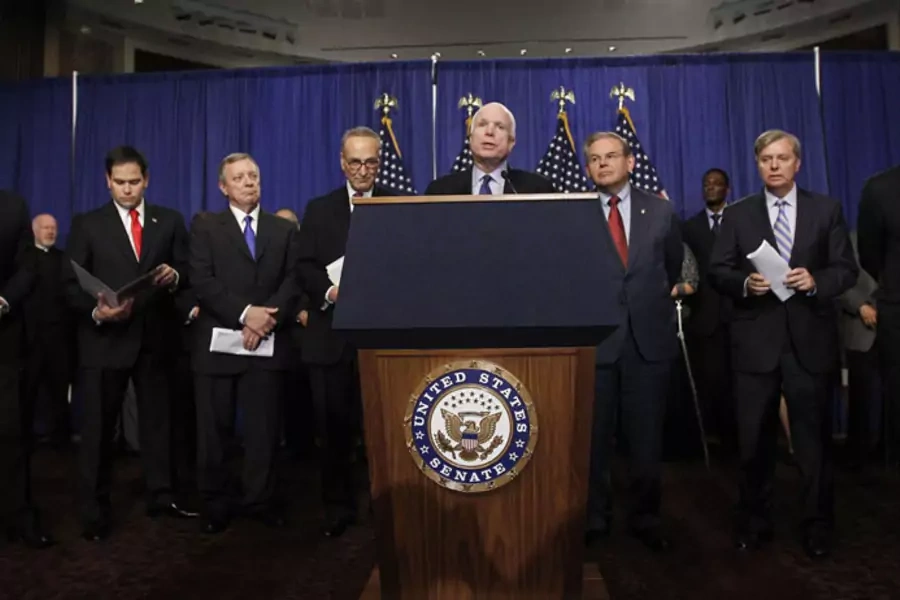The World Next Week: The Senate Debates Immigration, Cubans Get the Internet, and the Shangri-la Security Summit Begins

The World Next Week podcast is up. Bob McMahon and I discussed the Senate immigration bill, Cuba’s new Internet policies, and the Asia Security Summit.
[audio: http://www.cfr.org/content/publications/media/editorial/2013/20130530_T…]
The highlights:
- The Senate returns from its Memorial Day recess with immigration reform topping its agenda. A compromise bill written by the so-called gang of eight, a bipartisan group of senators, is up for a floor vote. The main sticking point is that the bill would give immigrants who entered the country illegally a (not very quick) path to citizenship. The bill’s opponents—there are quite a few, mostly on the GOP side of the aisle—will be offering “poison pill” amendments designed to make the bill unpalatable to its supporters. Republican senators on the fence about immigration reform will be weighing not just the bill’s merits but whether it has any chance of passing in the House. Lawmakers generally refrain from risking their political future on the behalf of legislation that is doomed to failure.
- The Cuban government has announced that starting next Tuesday, Cubans will be able to access the Internet at 118 locations around the country. Currently, only 5 to 10 percent of Cubans can access the Internet. The privileged few with access to the World Wide Web are mostly government officials and professionals like doctors. The lines to access the Internet are likely to be long. Cuba has 11.2 million citizens, which works out to roughly 95,000 people per Internet location. And checking out celebrity sightings and the latest cat videos won’t come cheaply. The Cuban government is charging the equivalent of $4.50 per hour to use the service; this in a country where the average monthly salary is $20. The question everyone wants to know is whether greater access to the Internet will strengthen or weaken the Communist Party’s rule. The Cuban government is betting that it can follow the China model and reap the Internet’s economic gains and still squelch political dissent. Opponents are hoping that the Internet will help usher the Cuban government onto the ash heap of history.
- Singapore is the place to be this weekend. Defense ministers, military chiefs, and other senior government officials from twenty-seven countries are gathering there for the International Institute for Strategic Studies’ Twelfth annual Asia Security Summit. Territorial disputes in the East and South China seas, NATO’s drawdown in Afghanistan, and concerns about Chinese hacking of government and business websites are the three topics likely to dominate the summit. Recent official U.S. statements and reports suggest that Washington has given up on the hope that private conversations can persuade the Chinese to curtail their rampant cyber espionage. So publicly naming and shaming is now on the table.
- Bob’s Figure of the Week is Sergei Guriev. My Figure of the Week is $4.7 billion. As always, you’ll have to listen to the podcast to find out why.
Today marks the last TWNW podcast arranged by our long-time producer, Millie Tran. Millie has been a gem to work with. Both Bob and I wish her the best with her new gig.
For more on the topics we discussed in the podcast check out:
Senate immigration reform: Reuters writes that House Republicans are unlikely to pass the Senate’s bill and that Marco Rubio’s concerns about the bill are worrisome for supporters. The Washington Post argues “why immigration reform has a shot.” The Wall Street Journal notes that the opposition to immigration reform is not as strong as it was during the last attempt to change immigration law.
Cuba’s new Internet policies: The BBC reports that Cuba will offer public Internet access for $4.50 an hour starting next week. The International Republican Institute gives Cuba low marks for freedom of speech. Freedom House analyzes Cuba’s policies on press freedom. CFR.org has a backgrounder on U.S.-Cuba relations.
Asia Security Summit: The International Institute for Strategic Studies has official information on the Shangri-la Dialogue and argues that the dialogue signals a “European pivot of interest to Asia.” AFP reports that U.S. secretary of defense Chuck Hagel will “follow through” on the U.S. commitment to a rebalance toward the Asia-Pacific. VietNamNet Bridge predicts that the Vietnamese prime minister will focus on Vietnam’s peaceful foreign policy during his keynote speech at the dialogue.
 Online Store
Online Store